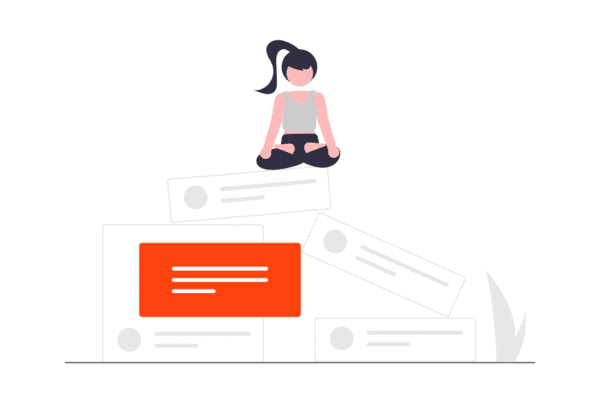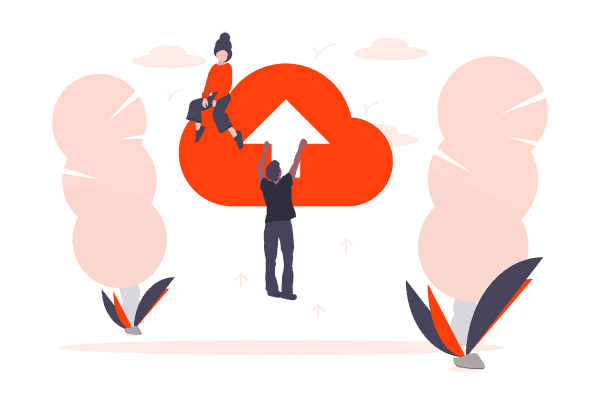You’re smart to be interested in SAP Conversational AI. The world turns to conversation. This change affects your two most important target groups – your customers and your employees – and you need to act.
By 2020, robots will handle over85% of interactions between customers and businesses, and67% of people expect to send more messages to businesses in the next two years. Last year,67% of consumers worldwide used a conversational interface for customer support.
The goal of this post is to give you a bird’s eye view of SAP’s artificial intelligence-powered Conversational AI platform. This way you can decide if the topic is relevant to you and, if so, dive deeper into the details.
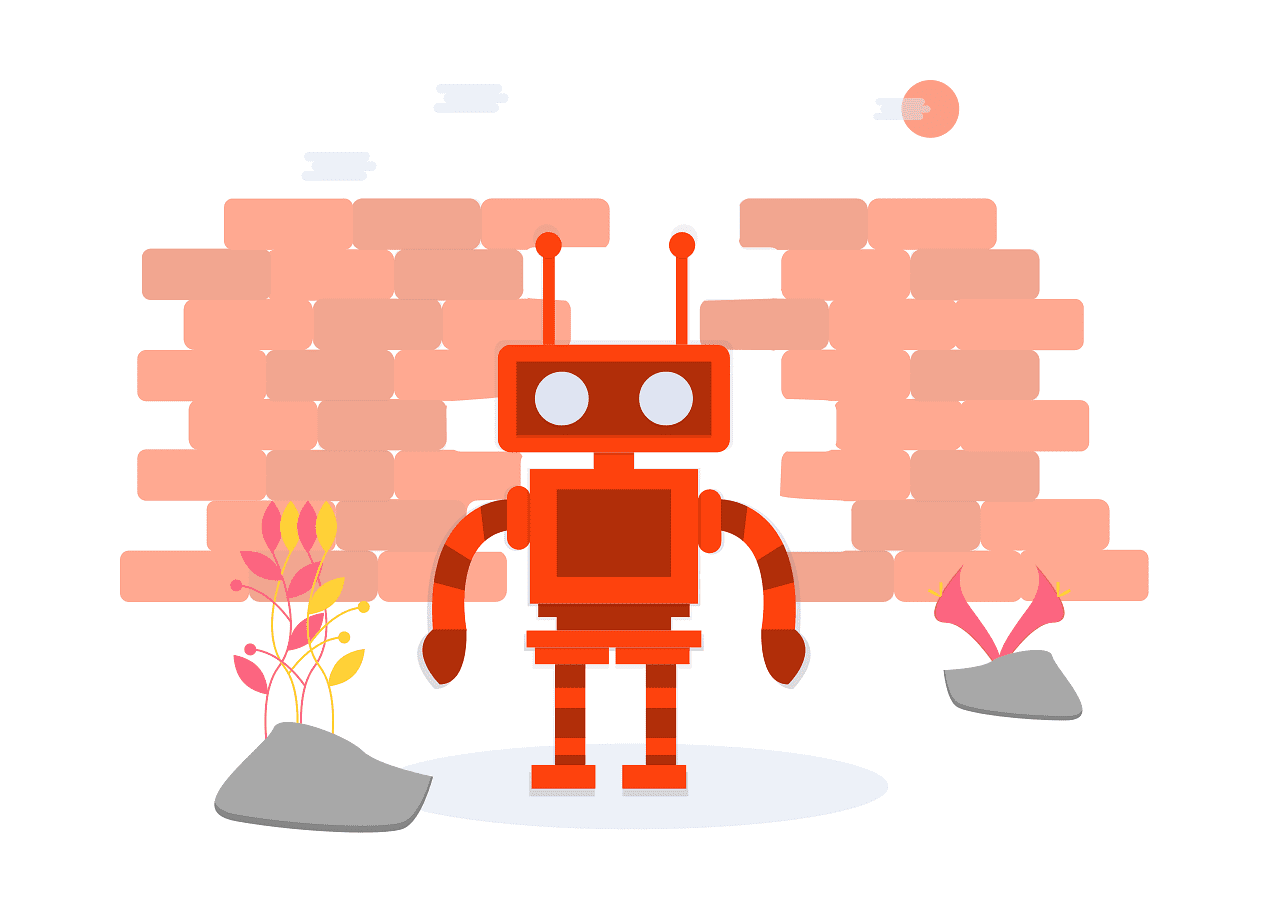
Overview
Let’s start with a brief overview. SAP Conversational AI is a comprehensive collaborative platform for creating chatbots. Together with conversational, natural language processing (NLP), and dialog management capabilities, as well as extensive API documentation, SAP Conversational AI makes it easy to connect your bots to almost any popular messaging channel.
You can invite others to work with you on your bots, or create a shared account (an organizational account) that allows groups of people to work on bots simultaneously. You can also create a FAQ bot that retrieves answers to users’ questions from one or more documents (.csv file ) that you upload.
Recast.AI (acquired in early 2018), now SAP Conversational AI (CAI), replaces the SAP CoPilot backend. The NLP part of CoPilot will be replaced by SAP CAI on SAP Cloud Foundry, while the user experience will remain similar and improved, including CoPilot chat features. Thus, the two technologies are combined to create the ultimate conversational experience.
Accordingly, to drive the Intelligent Enterprise, SAP is combining its two conversational products into one major offering: CoPilot and the startup formerly known as Recast.AI into SAP Conversational AI.
SAP wants to enable every user to interact smoothly with its software through a single conversational interface. This is the reason for the Digital Assistant. It is connected to SAP products, extensible for all use cases, and highly personalized and context-sensitive.
On the other hand, there is the bot building platform. This platform is SAP Conversational AI. It lets you build powerful conversational agents with robust training, building, generating, connecting, and monitoring modules. With the bot building platform, you can implement any size case in any industry. It is one of the easiest and fastest bot building platforms based on collaboration, community and a marketplace.
This future outlook underscores the importance of starting to build SAP Conversational AI knowledge in order to deliver a superior customer and employee experience.
Lernen Sie heute wie Sie einen Chatbot erstellen.
Use our guide to build your first full chatbot with SAP Conversational AI. It provides an overview of commonly used terms and includes the steps necessary to create their first chatbot. The bot is able to understand and respond to your intentions.
The platform
Let’s continue with a brief introduction to the platform and a detailed description of its features.
Recast.AI, now known as SAP Conversational AI (CAI), is part of the SAP Leonardo Machine Learning products. It is a collaborative platform that allows its users to implement conversational interfaces. This technology is mainly used to create chatbots. Other options include using it for voice assistants or IVR.
The end-to-end collaborative bot platform for developers enables training, building, connecting and monitoring chatbots through an easy-to-use interface and brings the benefit of natural language processing (NLP) based Deep Learning.
This allows users to parse sentences, identify their intent (classification), and extract essential information called entities (named entity recognition).
The CAI platform includes a complete suite of tools for creating bots. Developers can use the Train tool to train their bot to understand intentions and entities, and use the Bot Builder to build their conversation flows in a visual and easy-to-use interface.
In addition, the Bot Connector helps users connect their bots to different channels. Finally, with the Monitor tool, they can collect all the logs the bot has received, as well as usage and business analytics to improve the bot over time.
The features of the platform
Communication channels
The platform offers a bot connector tool integrated into the platform that supports channels. These include, for example, Slack, Twilio, Twitter, Telegram, SAP JAM Collaboration, Facebook Messenger, Microsoft Teams, Line, Webchat, SAP Conversational AI Web Client, and even voice assistants such as Amazon Alexa and Microsoft Cortana. Other channels can be easily integrated as long as they offer an open API. This includes Google Home, for example.
Note that some channels are limited in terms of the ability to insert functions such as buttons. For compatibilities related to UX components such as cards, quick answers, carousel, button list please check this page.
Fallback channels
Fallback Channels allow you to hand off a conversation from a bot to an agent. For handoff to a live agent, there are currently integrations out of the box with SAP Contact Center and Intercom.
Other services can be integrated as long as they offer an open API. Think HubSpot, Zendesk or Genesys, for example.

For integration, you should ask yourself the following questions about the live chat provider:
– Does your live chat offer an API?
– Does this API allow pushing messages to an agent?
– Is there a webhook system that allows a message to be answered by an agent?
– Is there a webhook system to know when an agent has ended the call?
If these conditions are met, integration with the service provider will be possible.
In addition, open connectors available as part of the SAP Business Technology Platform provide access to a wide range of non-SAP systems, including a broad range of help desk solutions.
These connectors complement SAP Conversational AI and accelerate chatbot integration with somewhat more closed systems.
Supported languages
CAI supports all languages with intent classification and Named Entity Recognition (NER) and enrichment functionalities.
German, English, Spanish and French have extended support. This means that you will be able to use gold entities. These are over 30 entities that can be extracted without training, for example days of the week or times.
SAP is a global company that understands the importance of interacting with local markets in their native language. More details can be found on this page.
The bots are multilingual, which means that users can talk to the bot in multiple languages, as long as you have added the language for that specific intent. For standard and advanced languages, the platform can recognize (classify) the language of the user input and respond accordingly.
Architecture
The critical components in the bot architecture are:
- The Bot Builder, which provides a user-friendly, web-based interface for creating and monitoring bots.
- The NLP API that applies the advanced techniques of Deep Learning such as intention classification, entity recognition, sentiment analysis, intention suggestions (during training).
- The Bot Connector, which is used to connect bots to various channels such as Facebook Messenger and introduce rich messaging such as images and message carousels.
- Integration with your IT systems and business processes, such as SAP S/4HANA or customer service fallback channels like SAP Contact Center.
SAP Conversational AI can be easily integrated into your IT or services. The platform is completely API-supported. This means you can request the NLP API or the Bot Builder API from a backend integration that can be hosted anywhere, be it on the SAP Cloud Platform, in your cloud, or on-premise.
As long as the client provides or makes available APIs or web services, you can quickly create a backend integration that interacts with the client’s APIs and the CAI platform’s API.
There is also an open source webchat that you can find on the SAP CAI Github page so you can customize the webchat to your needs. This could include adding new UX components like dashboards or adding built-in authentication. The webchat project is in ReactJS and can run on any website.
Bot Builder
SAP Conversational AI’s Botbuilder supports conversation setup and management with powerful bot skills. It interacts with the other services of the platform and the related process is divided into three different parts, which are described in more detail below.
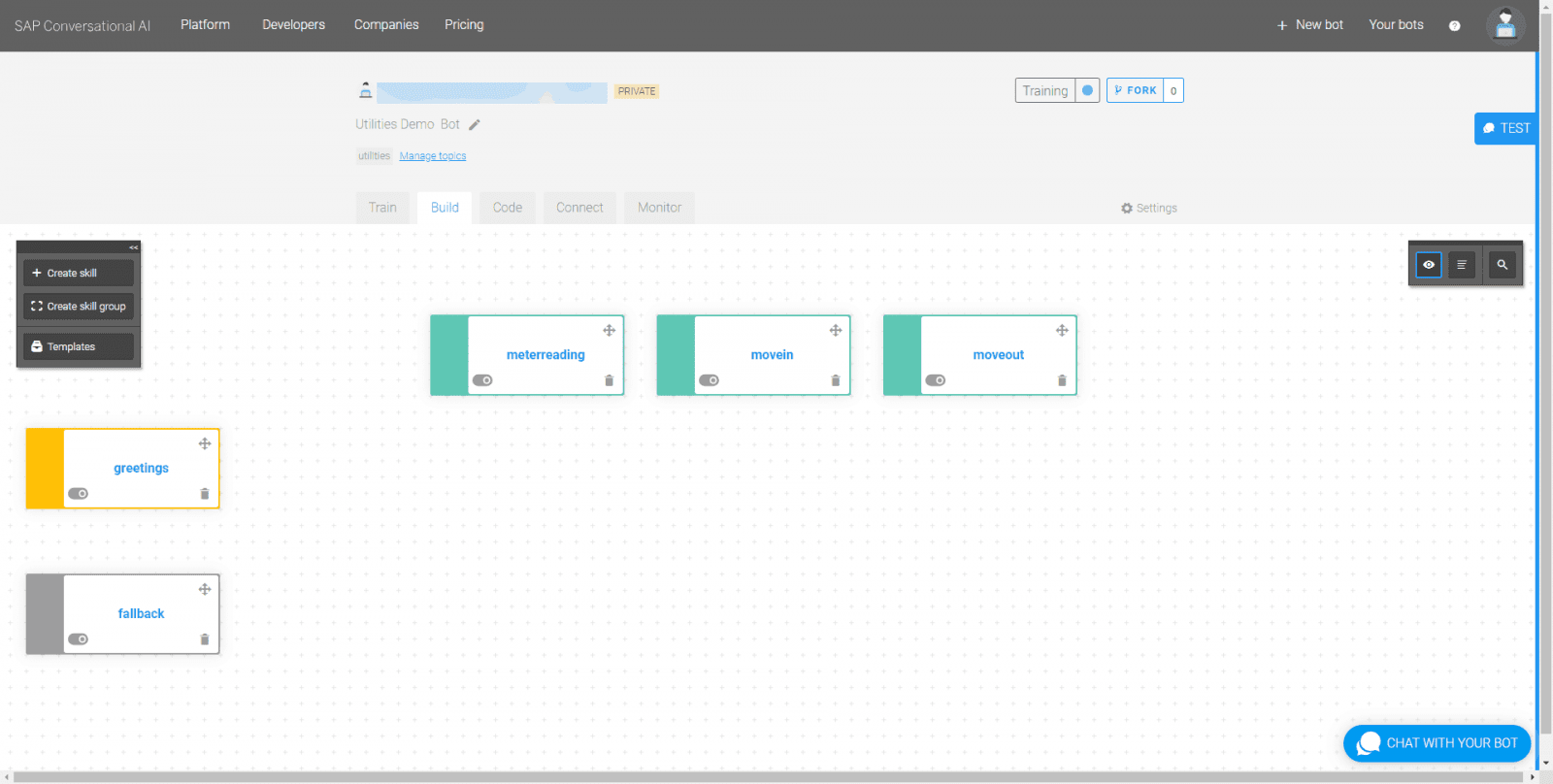
- Receive the user’s input via a messaging channel.
This is done by the Bot Connector. When the Bot Connector receives a message, it sends it to your Bot Builder. You can also collect user input in your own way and send it directly to the Bot Builder API. - Understanding the user’s input with Natural Language Processing (NLP).
Once the bot builder receives an input, it sends the message to the NLP API to extract structured information from the input. - Manage the conversation and context.
This step consists of using the JSON returned from the NLP API to manage the conversation using skills and conditions.
Conversational NLP API
The Conversational NLP API enables Natural Language Processing (NLP) powered by Deep Learning, which means it helps to truly understand your users. The API is the basis for the chatbot’s ability to learn to respond to further variations of an input from a basic set of given values without being explicitly programmed.

Bot Connector
SAP CAI’s Bot Connector API is used to connect to channels that your users use. It provides an integrated API and a standardized message format to connect your bots to any channel.
The Bot Connector API gives you access to the richest features of the largest number of news channels. A large number of input channels and fallback options are available as standard. This includes, for example, the SAP Contact Center.
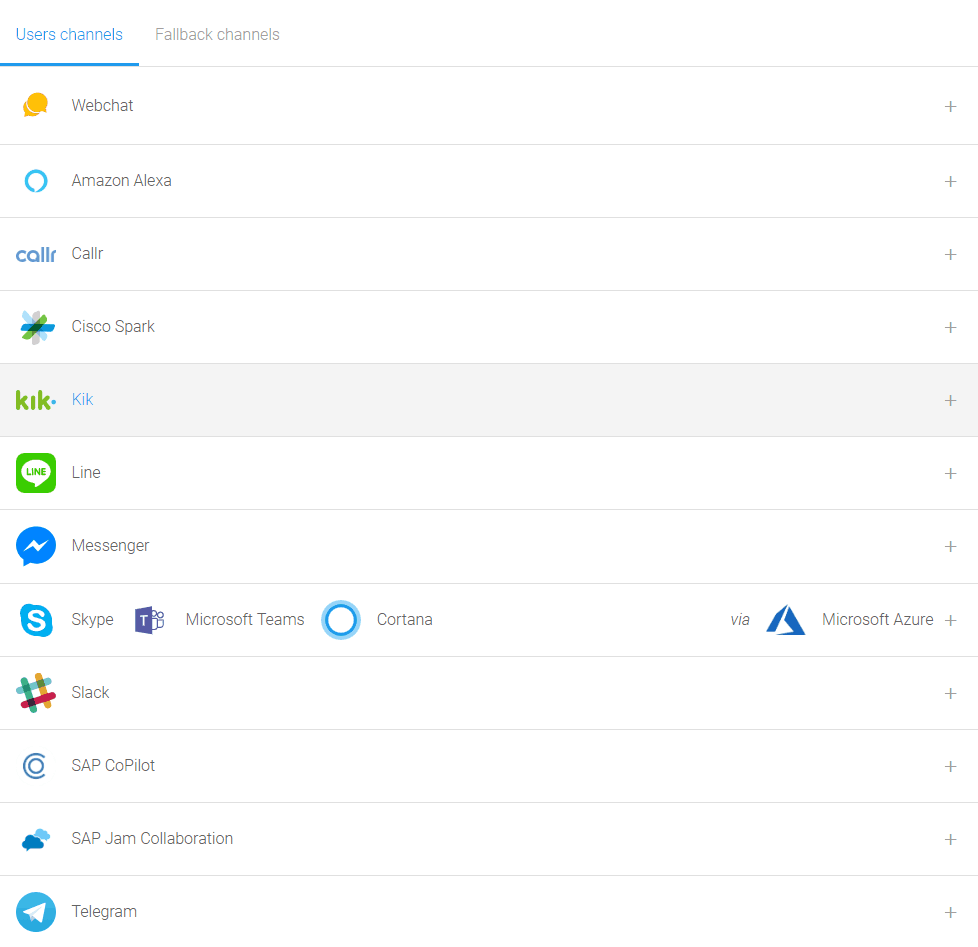
Bot management and collaboration
The Conversational AI platform provides an intuitive interface to help teams configure their bots through the Train tab. Within this tab, the developers of the bot can enter intentions as well as utterances and tag entities. This can also be achieved via the API.
Something very unique about the CAI platform is collaboration: within the bot’s settings, you can add collaborators to allow teams and many team members to work on the same bot.
Organizations
Through the platform you can be part of an organization. Organizations collect all accounts of the same company. Per organization, the administrator can decide whether all bots should be public or private by default, as well as the password policy for the entire organization.
Monitoring – Log feed
The monitoring tool available on the platform allows you to collect all the sentences ever sent to the bot. In this view you can see which sentences the bot has understood and which not. You can search the view by date, intent, entities and language.
The monitor is defined in Machine Learning as supervised learning. The platform does not support unsupervised learning for security reasons. If a bot in production uses unsupervised learning, nothing could prevent a competitor from sending a billion queries to the bot to skew the learning.
For this reason, CAI only offers supervised learning via the monitor. You can export all logs via .csv using the export function or the API.
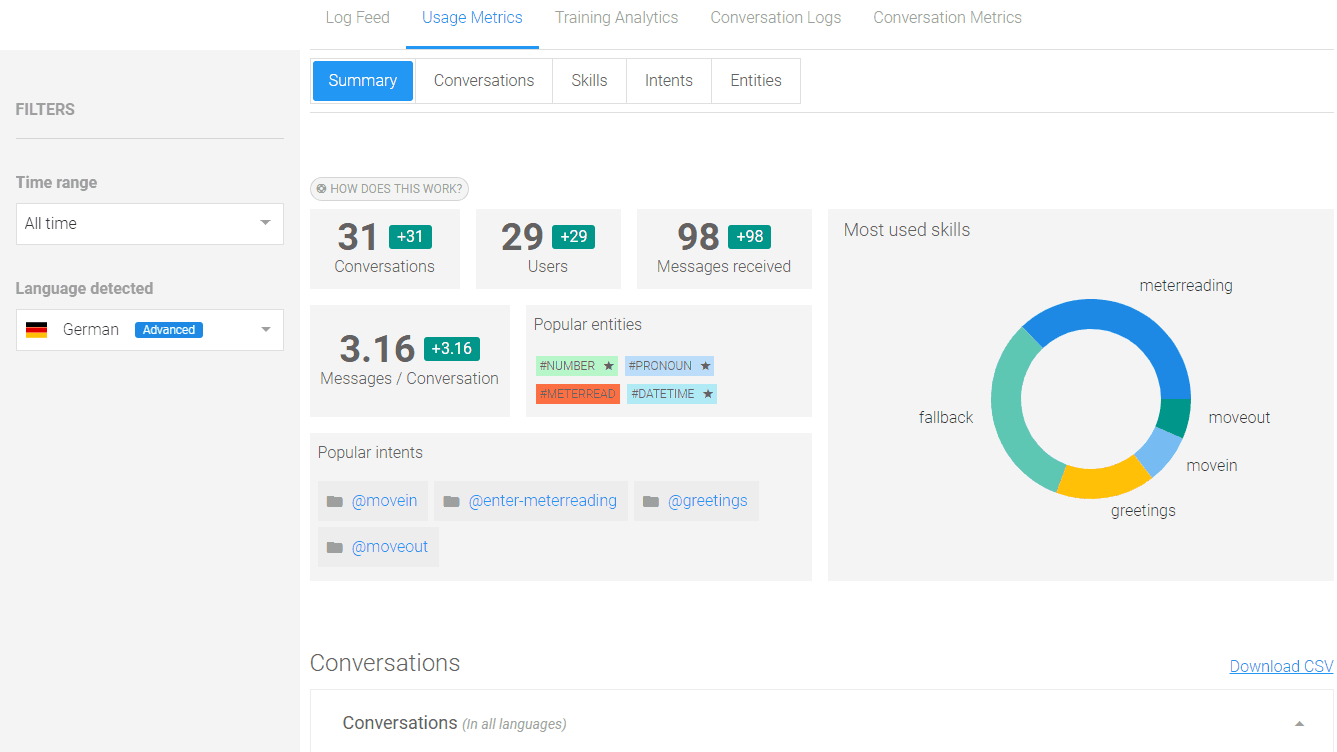
Monitoring – key usage indicators
Within the Monitor tab, you can also access the usage metrics. Usage metrics give you insights into how your bot is being used. The KPIs you can access through this tool include:
- Number of conversations
- Number of users
- most used intentions
- most used entities
- most used languages
You can search the data using a date selection or a language. All metrics are extracted from the conversations users have with your bot via the bot builder.
Monitoring – training analytics
Training analytics are the best way to understand your bot’s performance. The platform determines a score where your examples do not match the intent they were intended to be classified. This will give you a score per intent, weighting them per intent use, so you can see which intents are better than others. They also build a confusion matrix to help you understand where there is an overlap between your intentions.
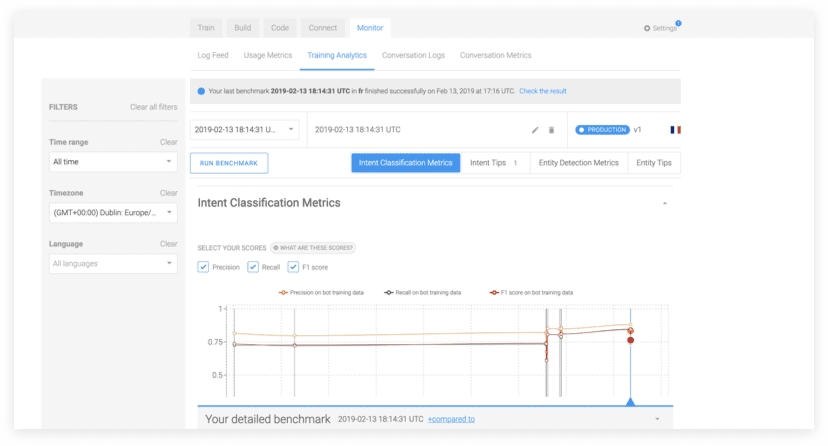
Versioning
The platform also handles versioning management. You can create different versions such as “Development” or “Production”. You can also create a modified version of your training and builder. This allows you to push versions into the environment to better manage version deployment, perform A/B testing, and use training analytics to compare the version against others.
Versioning is used only for Training and Bot Builder. You can set a specific environment for a channel and also get analysis and monitoring from a version or environment.
FAQ bot
The platform allows you to retrieve answers to users’ questions from one or more documents (.csv file) that you upload. The FAQ must contain predefined pairs of questions and answers. This allows your bot to map the user’s question to the best match and retrieve an answer without interpreting the intent of the question.
To simplify the complexity of the bot, the intentions and entities are pre-trained, and the bot contains a set of predefined capabilities. However, you can design the bot’s responses according to your company’s requirements.
API
The entire platform is fully API-based. Integrating with any service is easy, and any actions you can perform through the interface can be done through the API (i.e. creating bots, intents, expressions, or entities). Another advantage of the platform’s APIs is the fact that you can quickly extract all the data from the platform and format the output in a specific format.
They also provide an OAuth API to authorize authentication on behalf of a user. This makes it possible to create chatbots, add skills, and perform other actions via the API. This is very useful in the mindset of building a bot factory or replicating a bot that can be packaged or pre-built.
Product roadmap
SAP’s commitment to Conversational UX means that SAP will invest heavily in pre-packaged content, native integration and platform capabilities.
The latest releases show the first steps towards even easier creation of enterprise bots. SAP Conversational AI is available on Cloud Platform Cloud Foundry within your tenant and can therefore take full advantage of the qualities of SAP Cloud Platform. We also see the cost-effective integration of REST services without middleware or code.
The next logical step after that would be to enable multibot management and create a public bot marketplace between SAP, partners and customers.
It is likely that these changes in usage qualities will drive the product roadmap for 2020.
Further information
The first place to go for more information is the SAP help page. There you will find collected information about the solution. Other sources of information include the SAP Conversational AI blog and the SAP Community.
We have also written several other articles on the basics of architecture and how to increase customer satisfaction.
If you are interested in the process of a chatbot project, you can find initial information here. This information is based on the example of an energy supplier. However, you are also welcome to contact us.
With these sources in hand, you should find the answers to most of your questions. If anything is unclear, feel free to contact us.
Summary
SAP provides a powerful conversational interface platform to facilitate the creation of chatbots. The bot-building platform allows you to train, build, connect, and monitor powerful conversational interfaces in a single SAP tool.
SAP Conversational AI is part of the SAP portfolio. Therefore, your data never leaves the SAP ecosystem. It is also easily connectable with other SAP solutions, easy to use, in any language and made for business.
By building conversational interfaces with SAP CAI, you increase your productivity, your customer loyalty, therefore your revenue, and become the intelligent enterprise.
Take the first step to enhancing employee and customer experiencewith conversational experiences!
Lernen Sie heute wie Sie einen Chatbot erstellen.
Use our guide to build your first full chatbot with SAP Conversational AI. It provides an overview of commonly used terms and includes the steps necessary to create their first chatbot. The bot is able to understand and respond to your intentions.
Sprechen Sie mit einem Experten
Our latest blog posts on the topic of SAP Conversational AI
FAQ
What’s SAP Conversational AI?
SAP Conversational AI (CAI) is a platform for creating conversational interfaces – from chatbots to voice assistants.
What functionalities does SAP CAI offer?
SAP CAI provides a graphical construction kit for creating chatbots. With this graphical toolbox, users can create their bot quickly and easily without needing knowledge of a development language.
Is it easy to create a chatbot?
A realistic answer is – it depends. You will be able to quickly build a simple bot.
You can quickly try this out with the free trial version.
However, for a more complex and less error-prone bot, you need to invest more time. The time required depends mainly on how many integrations you need.
What to consider when building chatbots with SAP Conversational AI?
Hereare 5 key fundamentals and a design pattern for your first chatbot with SAP Conversational AI.
How does an SAP Conversational AI project work?
Hereyou will find a guide using the example of energy suppliers.
When should I use SAP Conversational AI?
SAP Conversational AI is generally suitable for all cases where you want to create enterprise conversational interfaces – be it a chatbot or a voice assistant.
However, the solution is particularly suitable for companies with an existing SAP landscape.

